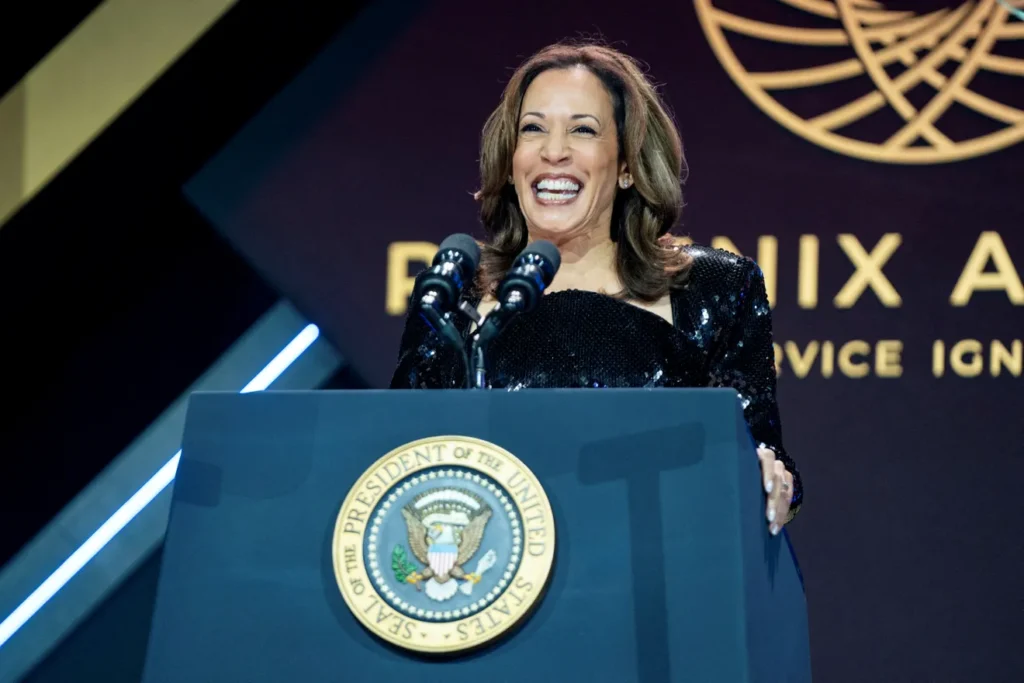Kamala Harris Engages with Black Journalists During Current Travels
Vice President Kamala Harris has made it a priority to connect with a wide range of communities during her travels, and her recent engagement with Black journalists has been a key part of that effort. These conversations, which are part of her broader outreach during her national and international trips, serve not only as a way to discuss the administration’s policies but also as a platform to address the unique concerns facing Black Americans today. By engaging directly with journalists from Black media outlets, Harris aims to reinforce the administration’s commitment to addressing racial disparities, social justice, and economic equity.
Strengthening Connections with the Black Community
As the first Black and South Asian woman to hold the office of Vice President, Kamala Harris carries a unique historical significance. Her identity and lived experiences make her a powerful symbol of representation in American politics, particularly for Black Americans who have long felt marginalized by traditional political structures. In her recent travels, Harris has made deliberate efforts to engage with Black journalists to emphasize the importance of direct communication with the Black community.
The vice president’s discussions with these journalists cover a wide range of topics, from the administration’s agenda on civil rights and criminal justice reform to economic empowerment and health disparities. These dialogues are critical in fostering trust and transparency between the Biden-Harris administration and the Black community, ensuring that policies reflect the needs and concerns of marginalized groups.
By prioritizing meetings with Black journalists, Harris is also acknowledging the important role Black media has historically played in shaping public discourse and advocating for civil rights. For decades, Black media outlets have been a crucial voice in elevating the concerns of Black communities and holding elected officials accountable.
The Power of Representation
Harris’s connection with Black journalists carries weight not just because of her policy priorities but because of the significance of representation itself. As a woman of color in one of the highest offices in the land, Harris embodies the aspirations of many Black Americans who have been historically underrepresented in political leadership.
During her travels, Harris has consistently used her platform to underscore the importance of representation in both government and the media. In conversations with Black journalists, she has discussed how her own experiences as a Black woman have shaped her views on issues like systemic racism, police reform, and economic inequality. This personal connection makes her outreach even more meaningful, as she is able to speak directly to issues that resonate deeply with the Black community.
Representation in the media is just as critical. By engaging with Black journalists, Harris is validating the voices of Black media professionals who are often overlooked by mainstream outlets. These interactions help amplify the voices of Black journalists and ensure that their perspectives are part of the national conversation.
Tackling Pressing Issues
One of the key themes in Harris’s conversations with Black journalists has been the administration’s efforts to address racial inequalities, particularly in the areas of criminal justice, health care, and economic opportunity. Harris has been a vocal advocate for police reform, drawing on her experience as a former prosecutor and state attorney general. During her travels, she has spoken with Black journalists about the importance of holding law enforcement accountable while also ensuring public safety.
Health disparities have also been a major focus, especially in light of the COVID-19 pandemic, which disproportionately impacted Black communities. Harris has used these discussions to highlight the administration’s initiatives to improve access to health care, including expanding Medicaid and addressing maternal mortality rates among Black women. Her engagement with Black journalists allows her to directly communicate these efforts to communities that have been historically underserved by the health care system.
Economic empowerment is another critical issue. Harris has highlighted the administration’s efforts to support Black-owned businesses, reduce the racial wealth gap, and invest in education and job training programs that benefit Black workers. She has stressed that economic recovery from the pandemic must be inclusive and equitable, ensuring that Black communities are not left behind in the nation’s path to economic growth.
Building Trust Through Direct Dialogue
In a political climate where trust in government is often fragile, especially among marginalized groups, Harris’s direct engagement with Black journalists helps build a bridge of communication. By meeting with these journalists, she is opening a channel for honest and open dialogue about the administration’s policies and priorities. These conversations allow Black journalists to ask tough questions and hold the administration accountable while also providing Harris an opportunity to explain and clarify the administration’s stance on key issues.
This two-way communication is essential for rebuilding trust with communities that have historically been skeptical of government promises. Harris’s approach recognizes that Black journalists are not just intermediaries but active participants in the dialogue about how government policies affect Black Americans.
A Broader National and Global Agenda
Harris’s engagement with Black journalists is part of her broader mission to address global and domestic challenges. As she travels across the country and abroad, she continues to focus on key issues like climate change, immigration reform, and strengthening international alliances. However, her focus on racial equity and social justice remains a cornerstone of her agenda.
By meeting with Black journalists, Harris ensures that these issues remain at the forefront of the national conversation. Her commitment to engaging with media professionals from underrepresented communities reflects the administration’s broader goal of ensuring that all voices are heard in the policymaking process.
Conclusion
Kamala Harris’s recent outreach to Black journalists is a testament to her commitment to fostering open and honest dialogue with Black communities. Through these conversations, she has been able to address pressing issues like racial inequality, economic empowerment, and health disparities. More importantly, by engaging with Black media outlets, Harris is recognizing the critical role they play in shaping public opinion and advocating for the needs of Black Americans.



